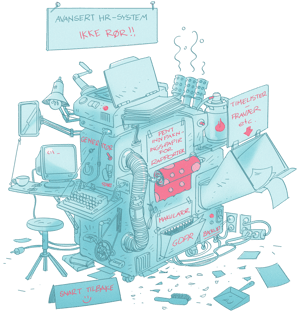It’s not news that digitalisation is changing the landscape of almost every industry, but technology is only the vehicle for change. People are aboard that vehicle, and without someone to drive and someone to navigate, you won’t get to where you intended to go.
If we take this analogy further to suggest that an organisation’s CEO is the driver, and the rest of the C-suite are his or her crew, who takes on the role of navigator?
 Maybe you’d be surprised to learn that the CHRO is already taking on many facets of that role today. In recent years, and with the advent of HR tech and process digitalisation, HR has gone from a purely administrative role to a key strategic partner. After all, no matter how much you digitise, people are the strongest and most important asset of virtually every organisation. It follows, then, that when the data pertaining to a business’s human capital is comprehensive and of high quality, it can be of crucial value in strategic planning, innovation, talent recruitment, and retention.
Maybe you’d be surprised to learn that the CHRO is already taking on many facets of that role today. In recent years, and with the advent of HR tech and process digitalisation, HR has gone from a purely administrative role to a key strategic partner. After all, no matter how much you digitise, people are the strongest and most important asset of virtually every organisation. It follows, then, that when the data pertaining to a business’s human capital is comprehensive and of high quality, it can be of crucial value in strategic planning, innovation, talent recruitment, and retention.
HR as an agent for lasting change
 When CHROs take the lead in the digital transformation process, they can – and should – offer much more to an organisation than new tools and revised processes. There is a huge opportunity here for creating long-term business value.
When CHROs take the lead in the digital transformation process, they can – and should – offer much more to an organisation than new tools and revised processes. There is a huge opportunity here for creating long-term business value.
Technology can significantly change the way an organisation functions, but focusing on the practicalities alone, without the emphasis on good change management, does not allow digitalisation to reach its full potential.
When you bring the value that digital transformation creates into focus, rather than simply looking at which day-to-day processes will be different, you help the changes stay in place and work for you in the long term. For that to happen, companies need to commit to a comprehensive change management process, and this means making resources available to see it through.
Moving ahead – and staying ahead of your competitors
The labour market is, arguably, in a state of unprecedented competition, and it’s likely to be that way for the foreseeable future. Today, top candidates are the ones who need to be impressed by employers, rather than the other way around. In short, employer reputation and branding has never been more important.
To put your organisation ahead of your competitors as a desirable employer, you need to do more than offer a good benefits package. Instead, it’s the entire employee lifecycle that will gain your business favourable ratings and posts on sites like Glassdoor and LinkedIn.

According to Gartner, by 2022, 50% of large enterprises will have invested in a major initiative to improve their manager experience by automating multiple work-related HCM tasks. Given that the purchase and implementation of an HR system can take a year plus change, if you’re not already beginning the process, you may at risk of being left behind.
Futureproofing your organisation
The role of the CHRO in preparing organisations for the digital future is multifaceted. With the right tools in place, HR can use concrete data to identify and report on past trends, identify skill and resource gaps, and help employees transition to the future of digital working conditions. When the administrative side of HR work is automated, your HR team are better able to focus their time on exactly these kinds of strategic tasks.
By definition, HR professionals have the knowledge and skills to bridge the gap between digital transformation solutions and the people who will use them. In this way, it simply makes good business sense to invest in systems that will support them as they help navigate your organisation’s journey into the working landscape of the future.
Free breakfast seminar in Oslo
CatalystOne is partnering with Quinyx to bring you in-depth information on this important topic. If you'd like to find out how to futureproof your organisation, register to join our free breakfast seminar in Oslo by signing up below.
(Note that the seminar will be conducted in Norwegian.)

